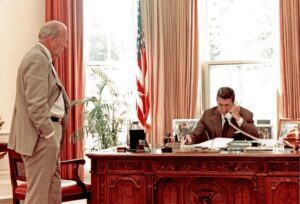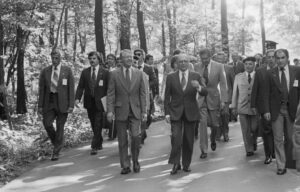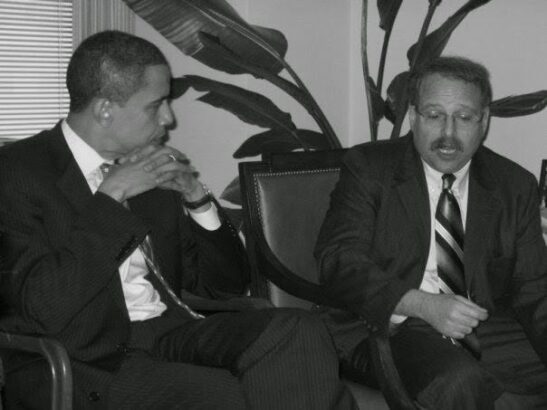In this exclusive interview, MJ Rosenberg reveals behind-the-scenes details about the influential pro-Israel lobby – and talks Jimmy Carter, Joe Biden, and AIPAC’s shift to the GOP right.
by Prem Thakker, reposted from Zeteo, February 11, 2012
If there’s one person who can give an unfiltered behind-scenes look at one of the most influential pro-Israel groups in the US, it’s MJ Rosenberg.
The Washington, DC, veteran spent more than four years at the American Israel Public Affairs Committee, better known as AIPAC, in the 1980s after working for more than a decade as an aide in the House and Senate.
Since leaving, Rosenberg – who has had the ear of the nation’s highest leaders, from Jimmy Carter to Barack Obama – has become one of AIPAC’s most vocal insider-turned-critics.
Last year, AIPAC pumped more than $100 million into US elections, supporting politicians from across the ideological spectrum – including election deniers – and primarying others.
It paid off. While AIPAC boasts of winning in every House seat an endorsee was on the ballot (albeit, often endorsing candidates they think already have a good chance of winning), the US maintained its unconditional support for Israel’s genocide in Gaza. The endless deference to Israel’s leader, Benjamin Netanyahu, was led by President Joe Biden, a self-described Zionist who, over his long career, became the top recipient of pro-Israel contributions among US senators since 1990.
Rosenberg – who helped write the “AIPAC line,” as he described it, penning speeches and editing the group’s newsletter blasted to officials in every branch – offers a unique perspective on how AIPAC strategy has evolved over the years.
Speaking to Zeteo before Biden left office, Rosenberg, who later worked at the Israel Policy Forum and Media Matters, gives an inside look at how AIPAC operates inside Washington. He also reveals some of his own interesting interactions with powerful politicians, including when President Carter told him that AIPAC helped cause “the worst mistake” he made during his presidency.
Can you tell us what AIPAC’s main strategy was when you were there? Any specific examples?
ROSENBERG: Its main priority was to ensure that the then — $2.2 billion military and economic aid package kept coming and that no conditions of any sort were attached to them. That required utilizing its “enforcers” on Capitol Hill (who were then almost all Democrats). In 1982, President [Ronald] Reagan was furious about Israel’s bombing of Beirut, so [AIPAC] used Hill Democrats and Republicans to ensure that his anger did not lead to any sort of punitive action by Congress or State, Defense, etc.

AIPAC’s overarching strategy was to prevent criticism of Israel by pretty much anyone of influence, whether in government or not. Accordingly, they had a war room where one guy had a whole staff devoted to tracking down negative statements by journalists and celebrities of any kind. The same guy was in charge of infiltrating Arab-American organizations and reporting back on their strategies. He used “Arab-looking” Jewish kids. They never accomplished much with the Arab organizations, but their spying on left-leaning Jewish organizations did lead to people [allegedly] losing their jobs when their employers found out they were secret peaceniks. McCarthyist tactics were always in their bag of tricks. If you got in the way, they rolled over you. This goes back to when I was there.
Was there a shift to the right? If so, when did this happen, and why?
ROSENBERG: AIPAC shifted to the right when Reagan was elected. That was in 1980 – about the same time that liberal Democrat Tom Dine became AIPAC’s executive director. This presented a problem [that] the big money people – the AIPAC officers – attempted to solve by crowding Dine to make sure he didn’t act on his personally dovish views.
Their enforcer inside was Steve Rosen, who monitored Dine’s actions and reported back to the board, and devised the idea of downplaying AIPAC’s traditional role as a lobby. It succeeded. Suddenly AIPAC was trolling around the Defense and State Departments as much as the Capitol. This was pretty effective, especially when AIPAC used its influence to get fellow Israel-Firsters appointed to key positions at Foggy Bottom [the State Department] and the Pentagon.
So, over time, they have become much more Republican. So it solidified.
What was it like to work there? What made you leave?
ROSENBERG: Well, my politics then were what is now called, ‘liberal Zionist.’ So, I really cared about Israel, and I was happy to go work there. I had volunteered for two years – I volunteered during the ‘73 [Arab-Israeli] war as my part of the war effort to help them, and at that point, they were trying to get [then-President Richard] Nixon to support the $2.2 billion aid package. Then I left [and] used my AIPAC contact to get a job on Capitol Hill. And then, after six years on the Hill, there was an opening [at AIPAC] to do editing and writing ‘the line,’ and I wanted that job and I went back.
First of all, I liked the people there. I really liked Tom Dine. I hated some other stuff there.
I hated the kind of violent rhetoric that was used against members of Congress who spoke up or anyone – really horrible, horrible language. I don’t mean foul language, but just kind of violent language. This ‘enemies’ business. ‘These were our enemies.’
It was also the fact that [Menachem] Begin was [Israel’s] prime minister. I couldn’t stand him. I couldn’t stand the Likud Party. I had to define myself as a Zionist, I was a labor Zionist – I liked the kibbutz and the socialism and all that stuff. And then this guy [Begin] and moving to the right.
So, everything was shifting right and then it translated to things with me. For instance, they told me that I had to refer to – this sounds so weird – that I had to refer to the West Bank as ‘Judea and Samaria.’ And I said, ‘No, I won’t,’ and ‘That’s ridiculous.’ And [it went] back and forth with one board member, who was tasked to take me on on this issue. And then his fallback was, ‘Put West Bank in quotes.’ And I said, ‘No, I’m not putting the West Bank in quotes.’ I said, ‘If you want to look like you’re a propaganda sheet, you do stuff like call it Judea and Samaria and put West Bank in quotes. But if you want to be taken seriously, you don’t.’ Well, that got me out of it, because I said everyone will see right through it.
They were slowly moving into the crackpot area where everybody was, you know, ‘enemies.’
I could tell the story in such a way that I left because I was disgruntled or upset by their policies on Israel. It was more like AIPAC. AIPAC itself came to really offend me as an overbearing organization, and my evolution on Israel came. Again, I was never for the occupation, I was always against settlements and all that stuff. And in those days, they never talked about settlements. So, in other words, I never had to defend settlements, because that was a right-wing [issue] that they just didn’t want to be associated with it. So, they weren’t as bad as they are now. But it was also the Israel stuff.

I enjoyed my job, but as Steve Rosen’s influence grew and Dine was being backed into a corner, I liked it less. I left for a higher-paying job on good terms with everyone there except Rosen and his protege Martin Indyk.
They had a really nice party for me when I left. I wasn’t considered someone who was a defector. I majorly became a defector later, but it was because I woke up. I’m not gonna say that Israel changed. I want to say more like I woke up to what Israel was.
What do you make of AIPAC as a political fixture now, relative to when you were part of it?
ROSENBERG: AIPAC changed dramatically when they became a PAC. When I worked there, and until very recently, the way they claimed to operate was as a lobby – which basically meant that they lobby; they had a whole big legislative staff that would go up to Capitol Hill and convince members of Congress to support this or that, whatever it is they thought Israel wanted. And it was not stated, at least, but in those legislative meetings, that if you do the right thing, you’ll get money.
Now, with this PAC, they could just dissolve the whole legislative shop, because all it now is – they’re basically stating, ‘Here is what we want you to support. Here is how much money we gave to members of Congress and candidates for Congress last time. Here is the money that we spent to defeat members of Congress who didn’t follow our recommendations, and you want in on that party? You got to vote.’
What is going to matter in the future, whether they understand this or not, is no matter how much money they have, they’re losing American public opinion.
Why are politicians so afraid of AIPAC?
ROSENBERG: AIPAC is a classic bully. It tends to go after those they think they can beat. I have never known them to target a member of Congress whose position was secure. That is why they jumped in to defeat Jamal Bowman and Cori Bush [last] year but barely paid any attention to Ilhan Omar and Rashida Tlaib, both of whom are far more influential than Bowman and Bush put together. But Bowman and Bush were likely to lose anyway so AIPAC jumped in to claim credit.

But they are powerful despite their being all bark and not much bite. Legislators don’t like dealing with flack on any issue. They just want to be left to do what they want to do. What they don’t want is having to explain themselves to rich people from their districts enraged by a statement they made about Israel. So why bother?
The Gaza war is changing this. Suddenly, there is a force in their districts (in many more districts than those where AIPAC is strong) that is going to hassle them from the other side. After the Gaza genocide, Israel is not just an issue where the Israel side is both the popular one and unchallenged. No more.
You’ve drawn a lot of attention for using the term “Israel-firster” in the past – including criticism from the likes of Alan Dershowitz. What first brought you to use that term, and what’s your reflection on it since, especially over the past year?
ROSENBERG: The first time I used it, I don’t think I thought it would be controversial, because they’re obviously Israel-firsters. They – meaning the lobby, and the people who support the lobby – put the interests of Israel above those of the United States or of any place else. Basically, they are saying that whether you’re right or left, whether you’re environmentalist or anti-environmentalist, whether you’re pro-choice or pro-life, no matter what you are, Israel comes first, and you lay those other things aside and you support what AIPAC thinks is best for Israel. I mean, do they really think that these things they support are best for Israel? No, it’s what Netanyahu tells them is best for Israel. So that’s what I meant by Israel first. And that is why AIPAC is increasingly moving closer to the Republicans.
There are several politicians who go beyond even the bipartisan consensus on Israel, including people like Sen. John Fetterman, for example. How do you view these figures?
ROSENBERG: First of all, I only talk about Democrats because I don’t think Republicans matter on this issue. Republicans are not selling their soul. You don’t have to really buy them. They’re mostly anti-Muslim, anti-Palestinian, pro-war – all their instincts point them in the direction AIPAC would send them anyway.
Fetterman, I think he might just have one of those personalities where he just decides to be contrarian. The people who thought he represented their base got mad at him because of the Gaza war. So he decides, ‘fuck them – I’m going to stick it to them on everything.’

One thing is for certain. And I worked both on the Hill and at AIPAC for more than 20 years. The number of people who are actual true believers in what they jokingly at AIPAC call ‘the cause,’ – and they say it jokingly, they put little quotes around ‘the cause’ – there are hardly any of them.
[For many,] it’s just kind of…the whole thing is manufactured. It’s made of like tissue paper. I mean, it doesn’t look like that when you have something as heinous as the Gaza genocide come along, and the majority of them still stick with Israel, but they’re not feeling it the way they’re used to. It’s harder. An example of that is [Rep.] Jerry Nadler. He was so ignorant on Israel stuff that when I did actually lobby him on it, I remember saying to him something about checkpoints [in] the West Bank, and how hard it was to get from one town to another town. He said, ‘Well, they don’t have checkpoints inside the West Bank. They have checkpoints between Israel and the West Bank.’ I said, ‘No, they have them all over the West Bank, blocking freedom of movement. In fact, they have flying checkpoints.’ And he turned his back to me and said, ‘You’re lying.’ And I thought, ‘Do you not read anything? Do you people know nothing?’What’s the relationship between Joe Biden and AIPAC?
ROSENBERG: I think that Joe Biden is in a time warp or something. It’s still like you might as well be like Hubert Humphrey or Walter Mondale or Pat Moynihan, or one of those old-time senators. You know, ‘Israel is the underdog. We’re on the side of Israel, because it’s right and because Israel is a democracy.’
I’m definitely not a Joe Biden fan, but I don’t think the money had anything to do with it. It’s just who he is. I’ve seen him speak so many times, and I’ve even spoken to him in private and everything. The only thing that surprises me about him is he’s super knowledgeable about the Israel-Palestinian issue, at least he was when he was in his later Senate years. I mean, [he] knew all the personalities… he has just a simplistic view.

I think that his compassion is a local kind of compassion. It’s to his family and to his larger family, like the American people.
I don’t think that he would have been as moved as Reagan was when Reagan saw the TV pictures of Beirut and says, ‘Get Begin on the phone’ and just ‘stop the bombing now.’
I’m not impressed with him as a compassionate person. When you’re very devoted to your own family, that’s great, but the test of compassion is how we do when it comes to strangers.
But I don’t think there’s [anything] nefarious or anything like that. He’s just an old kind guy; they are all kind of old kind guys – I mean, Bernie Sanders is the same generation. But some old people – and I say this as an old person – some old people learn and grow as they get older, and some, they’re just, they’re calcified. And that’s Joe Biden, and most of them (not most old people, but these congressional types).
What are your thoughts on the Biden administration’s legacy?
ROSENBERG: It is terrible, terrible. Frankly, I think he only has two legacies. One is closing his eyes to genocide in Gaza perpetrated by American weaponry and with the endless and undying support of the United States. And part two is causing the election of Donald Trump [by] being so inept politically and being so greedy about staying in office and not allowing the Democratic Party to nominate whoever they wanted.
It’s going to be more than 50,000 dead in the end, but maybe double that. How could there be any legacy that goes beyond that? Genocide committed with the permission of the United States.
I went to Palestine for one of the elections that they had before Hamas took over. Jimmy Carter was in the delegation, and one day I was having lunch. He sat down. I couldn’t help it, I went off on my AIPAC rant, and he said, ‘You don’t have to, I know all about AIPAC.’ And he said, ‘You know AIPAC caused me the worst mistake I ever made in my presidency, which was I didn’t push the Palestine part of Camp David. I just did the freestanding Egypt agreement because my staff and other people in Congress were telling me, ‘Just take the easier thing. You can do the Palestinians later, when they knew that this was the moment, and if I didn’t now, the Palestinians would never get it.’ And he said, ‘I blame myself for that.’ And wow, history could sure be different, because we see what he turned out to be and where his heart was.

He and George [HW] Bush both believed that they lost the elections because they pressured to the extent that they did on Palestine. But I think that’s going to change. You know, in this case, [Vice President Kamala] Harris might have lost because they didn’t. Not necessarily because of Michigan, I just thought the way it looked…I mean, how different might her campaign have gone, if, when they asked her on that show, ‘The View,’ can you think of one difference, if she would have said, ‘Well one, I differ with him on the Gaza war’. What, she was worried about hurting his feelings?
This interview has been edited for length and clarity.
Prem Thakker is a politics reporter whose interests include climate and the environment, corporate and political corruption, civil rights and justice, and labor. Prem previously worked at The Intercept, The New Republic, The American Prospect, and CNN. He grew up in North Dakota and now lives in Washington, D.C.
RELATED ARTICLES:
- Nearly Two-Thirds of All Campaign Funds for Cori Bush Challenger Came From AIPAC
- AIPAC Is Secretly Intervening In Portland’s Congressional Race To Take Down Susheela Jayapal, Sources Say
- AIPAC’s vast campaign to unseat pro-Palestine US lawmakers
- AIPAC Israeli Economic Espionage Against U.S. Hits $366 Billion
- How Does AIPAC Shape Washington? We Tracked Every Dollar.
- AIPAC: Has the pro-Israel lobby bribed and bought the US Democratic Party?
- Massie Taunts AIPAC After Demolishing Primary Challengers
- Who’s Funding AIPAC’s Political Spending Barrage?
- Here Are the Top Recipients of AIPAC Money





